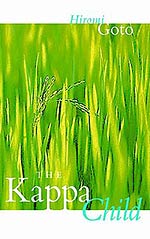
![]() couchtomoon
couchtomoon
9/9/2015
![]()
It hasn't been since Babel-17 that I clambered onto the couch on a Saturday morning, just to read a few pages, and barely moved until I absolutely had to. Like its name suggests, this is a book that will inhabit you.
It starts with some silliness: A quirky driver in the midst of traffic chaos. Honking horns, clanking shopping carts, CB static; a lotta onomatopoeia. Some over-the-top quirkiness. This protagonist is quirky, the quirky narrative wants us to know.
So I think, aww man, this is going to be too cutesy for me. I don't think I'm going to like it. Like a briny sea, it's just too much quirkiness to sink below the surface. Consciousness of the act of reading keeps me afloat.
But then suddenly, I sink. It probably took me about 25 pages.
Okasan says that books make for good companions, but they can't hug you back. That's true, but then, being family doesn't mean they can hug you either. And to top it off, they aren't even good companions. Put it this way: A book will never ask for a hug you don't want to give (137).
Feelings of desertedness and desertness permeate this 2001 Tiptree Award-winning tale about a second-generation daughter of an immigrant family on a Japanese rice farm in the arid midlands of Alberta. Where sisters show love through affective violence, where a mother protects her daughters with salt, where fragile friendships are cultivated in the dry pages of Little House on the Prairie, our protagonist's esteem is destroyed in self-defense and self-loathing. All rooted to a father whose unchecked idiocy traps the entire family in paralyzing and helpless misery. This is a study of dysfunctional family dynamics from a second-gen immigrant's perspective.
Maybe it was the ultimate challenge, the last immigrant frontier: to do the impossible in a hostile land. Maybe he was just an asshole and couldn't admit he was wrong.
... so we lived in the bitter halfway house of rural poverty (192).
It's easy to see the literary conceit stamped all over this tale, but, like a cool, refreshing Japanese cucumber, the crisp genre elements snap that dusty conceit in half with juicy revelations about Japanese fairies, delusional psychology, and maybe a UFO abduction. Maybe.
A quick preread glance through blurbs and review first lines hint at mystical pregnancy and an obsession with cucumbers. So naturally, I expect cucumber sex. It's not quite that organic, so the cucumber erotica subgenre is yet to be filled--er, sated--er, fuck it, engorged.
Despite the literariness of it all--this is written by the Writer-in-Residence at the University of Alberta--the abuse, neglect, self-hate, and family trauma is all very SF. Weird, with nasal spray addictions and pajama wardrobes and sadness glands and bodily inhabitations, ("a strange sensation to have your ass kicked from the inside" [138]). Comical, with chapter titles like, "Laura Ingalls Wanted to See a Papoose Something Awful" (188). You won't read this and walk away feeling shitty about being human. Like the grassy green cover suggests, like the cucumber fixation hints, this is a fresh, verdant tale about dysfunction and re-generation. Dysfunction SF-ified.
And here is where I shout into the digital cosmos: Reprint! Digitize! More Goto!
http://couchtomoon.wordpress.com